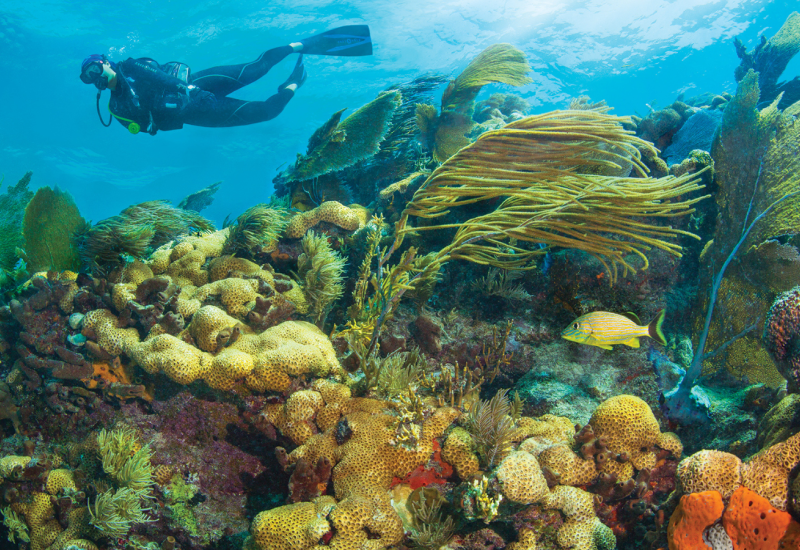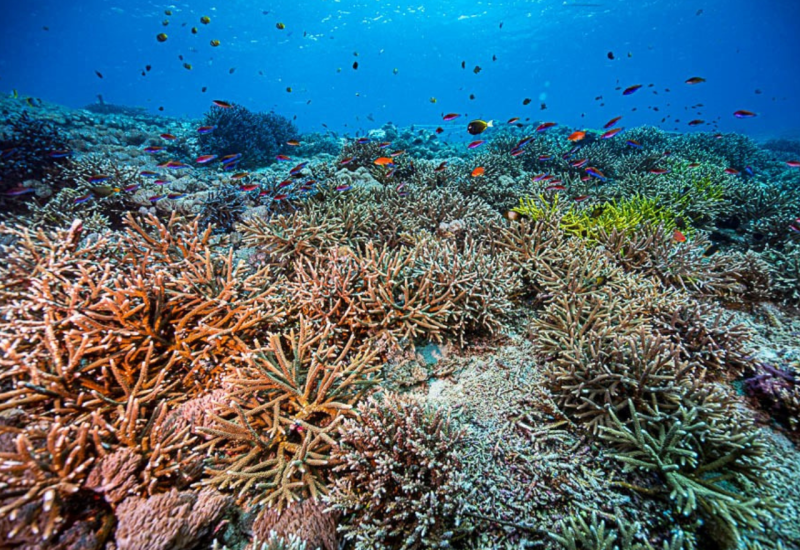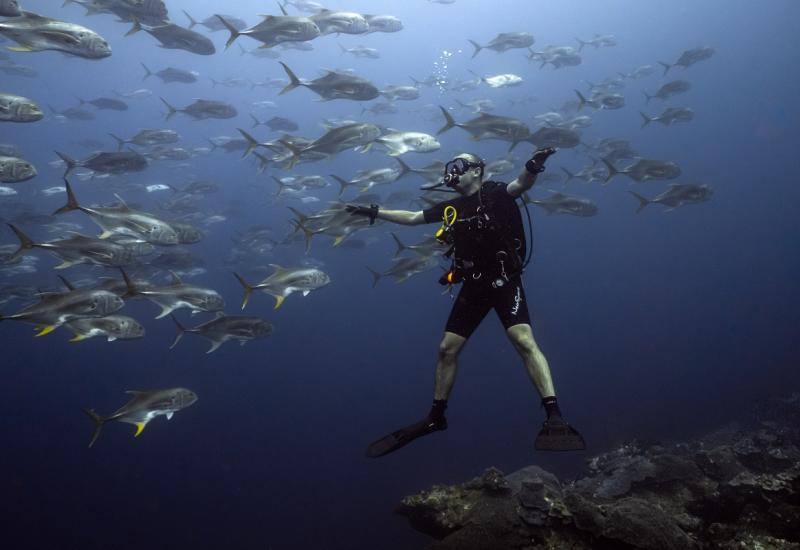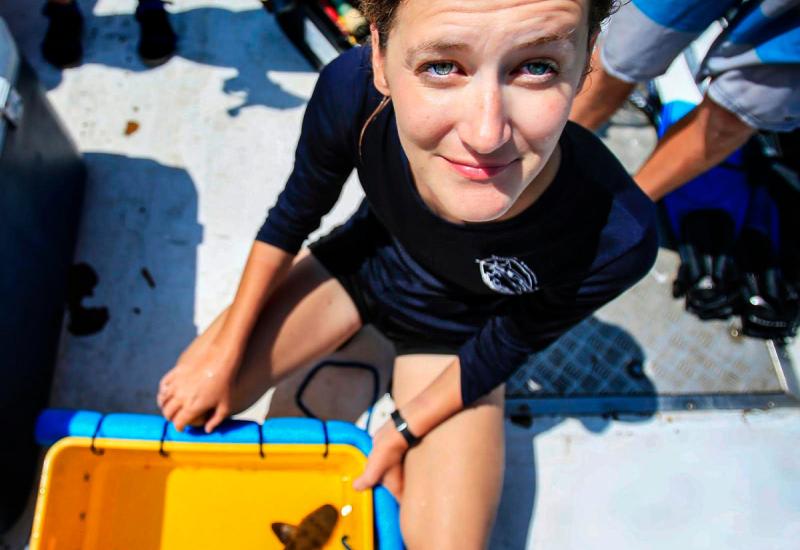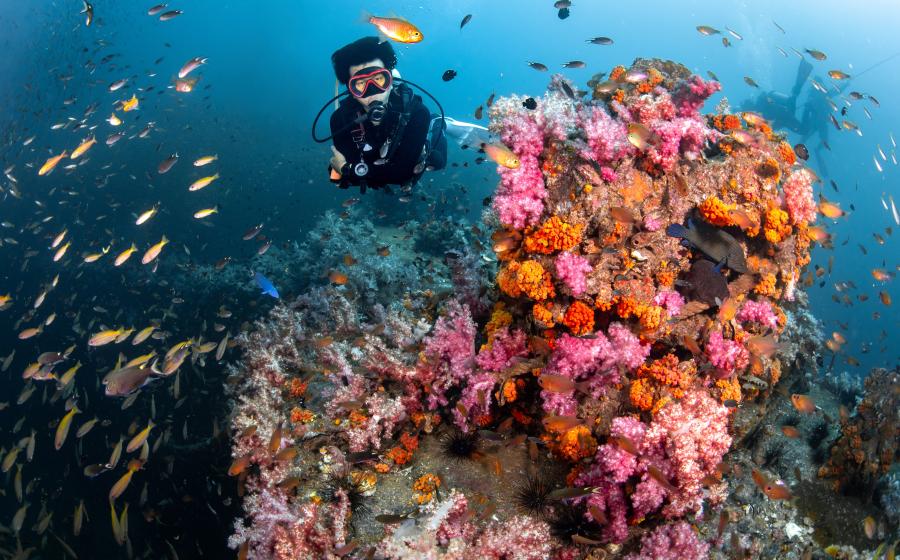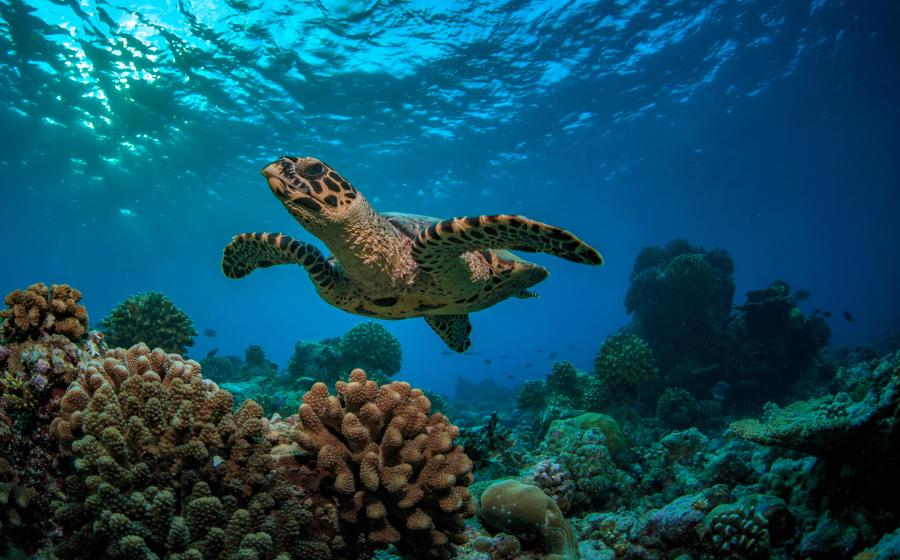Ask an Expert: Is Spearfishing OK on Scuba?

Spearfisherman on scuba
Experts weigh in on whether or not it's OK to spearfish on scuba.
Shutterstock
For some divers, spearfishing is a great past-time. It’s a way to spend time in the water, enjoy the environment and take home a pretty tasty meal. It is also better than less-discriminate methods of fishing like long lines or nets. These arguments aren’t unlike those made by terrestrial hunters, who hunt populations of animals such as white-tail deer in the Northeastern United States that continue to thrive.
For others, spearfishing on scuba selectively culls the biggest and best marine animals from the gene pool right when they are at the peak of their sexual and reproductive maturity, which significantly degrades their ability to reproduce.
SPEARFISHING ON SCUBA IS A PREFERRED WAY TO FISH
“I would never shoot a grouper that I could not 100 percent identify as a legal size. Fishermen and long liners do not have the luxury of deciding what they take. The bait and hooks do not discriminate, and taking a small fish from 100 feet to the surface that quickly literally blows the fish up. Long story short: Spear fishing grouper has little impact on the numbers of fish we see today. It is the long liners who are destroying our fish population,” said experience spearfisherman Jerrod Albright.
“I feel spearfishing is the best way to harvest marine fish, specifically because you virtually eliminate unwanted by-catch of small grouper and undesired species that would normally be caught with hook-and-line harvest. As a scuba diver, you also learn the habitat and relationship that grouper play in the subtropic ecosystem. Spear fishing makes you a better angler!” said Jay Clark , who is also a spearfisherman.
SPEARFISHING ON SCUBA IS DETRIMENTAL TO MARINE LIFE
Others argue that selectively killing the biggest fish when spearfishing on scuba is exactly the problem.
“The main indicator of ‘fitness’ in fish is size — it really matters. A 100-centimeter grouper produces about 15 times as many eggs as a 40-centimeter grouper does. Spearfishers target the last remaining large fish. This leaves the smaller fish to their less-vigorous reproduction and decreases the total reproductive output and, thus, the total fish in future populations,” according to Melanie McField, director of the Smithsonian Institution’s Healthy Reefs Initiative.
Some species of fish come to shallow water to lay their eggs, where the males are left to guard the nests. When the male guardian is killed, the eggs will also die.
Spearfishing on scuba also allows hunters to chase fish deeper, taking away the fish’s refuge. In the abstract of his study, “Depth Refuge and the Impacts of Scuba Spearfishing on Coral Reef Fisheries,” Steven J. Lindfield concluded: “Comparisons between Guam and the nearby Commonwealth of Northern Mariana Islands revealed differences in the assemblage of fished species and also greater size of scarines (parrotfish) and acanthurids (surgeonfish/unicornfish) in deep water where scuba fishing is banned. These results suggest that scuba spearfishing impacts reef-fish populations and that the restriction of this fishing method will ensure refuge for fish populations in deeper waters. We recommend a ban on scuba spearfishing to preserve or aid the recovery of large, functionally important coral-reef species and to improve the sustainability of coral-reef fisheries.”
****CONCLUSION****
There is quite a lot of difference of opinion on this topic from scientists and divers, some of whom are also spearfishermen. Everyone seems to agree that spearfishing has less by-catch and waste than net or long-line fishing. And everyone agrees that it takes common sense, safe diving practices and experience to be a good spearfisher on scuba.
Kell Levendorf, director of training and community development at Divers Direct summed it up by saying, “I do not believe that recreational spearfishermen — even on scuba — pose a significant threat, provided they follow the laws and regulations and display common sense in environmental awareness. Then again, when I see pictures of Goliath Groupers with spears through their heads, I am reminded just how difficult a task that might be.”
Still, you only have to look through some of the early dive magazines from the 1950s and early 1960s when everyone in the water was spearfishing. The size of the fish they were photographed with is incredible, and there isn’t anything like that in the water today.
**Want more expert opinions from Scuba Diving? **
** Are Oil Rigs Good or Bad? | Are Rebreathers Recreational? | Should I Wreck Dive without Training?**
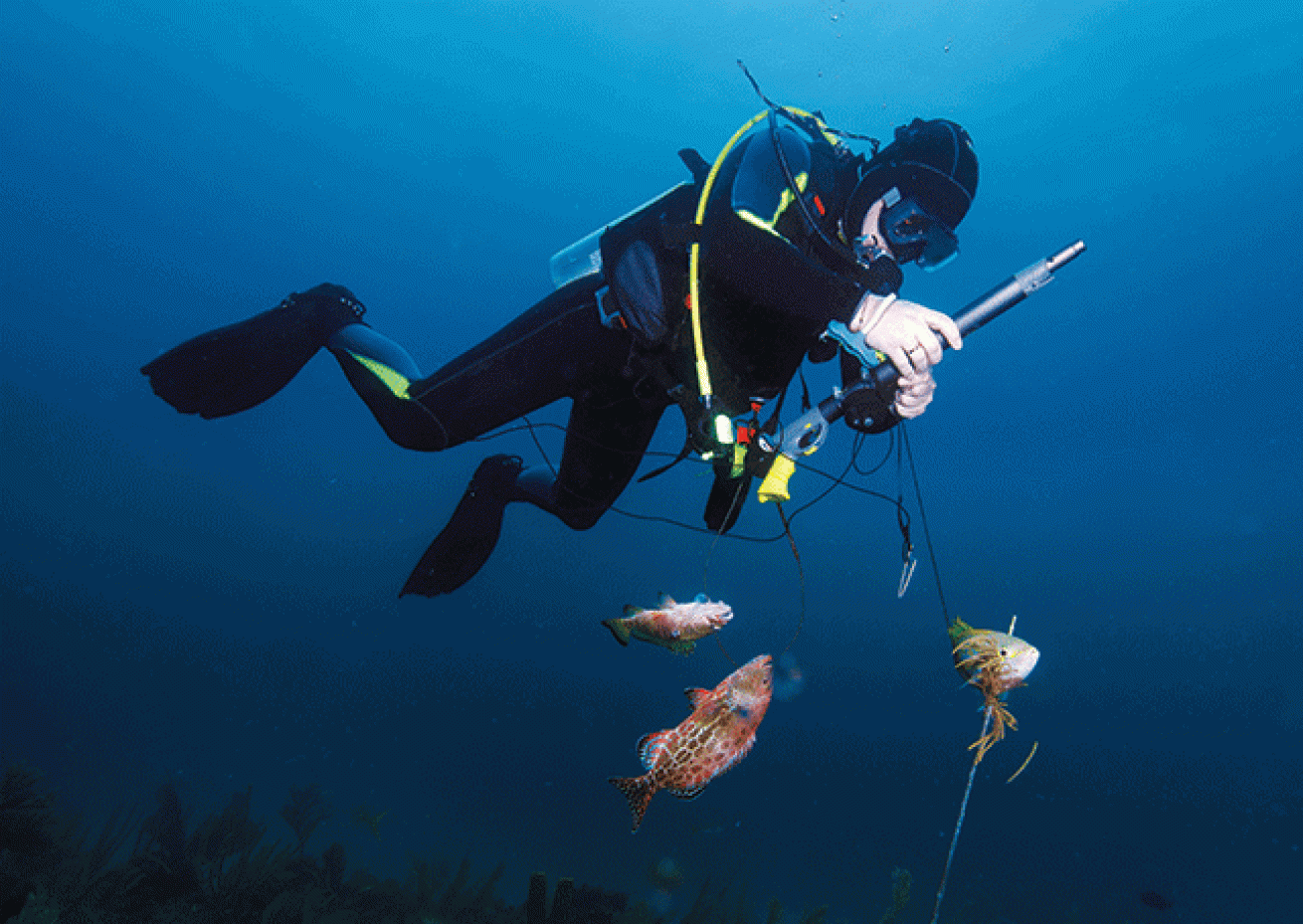
ShutterstockExperts weigh in on whether or not it's OK to spearfish on scuba.
For some divers, spearfishing is a great past-time. It’s a way to spend time in the water, enjoy the environment and take home a pretty tasty meal. It is also better than less-discriminate methods of fishing like long lines or nets. These arguments aren’t unlike those made by terrestrial hunters, who hunt populations of animals such as white-tail deer in the Northeastern United States that continue to thrive.
For others, spearfishing on scuba selectively culls the biggest and best marine animals from the gene pool right when they are at the peak of their sexual and reproductive maturity, which significantly degrades their ability to reproduce.
SPEARFISHING ON SCUBA IS A PREFERRED WAY TO FISH
“I would never shoot a grouper that I could not 100 percent identify as a legal size. Fishermen and long liners do not have the luxury of deciding what they take. The bait and hooks do not discriminate, and taking a small fish from 100 feet to the surface that quickly literally blows the fish up. Long story short: Spear fishing grouper has little impact on the numbers of fish we see today. It is the long liners who are destroying our fish population,” said experience spearfisherman Jerrod Albright.
“I feel spearfishing is the best way to harvest marine fish, specifically because you virtually eliminate unwanted by-catch of small grouper and undesired species that would normally be caught with hook-and-line harvest. As a scuba diver, you also learn the habitat and relationship that grouper play in the subtropic ecosystem. Spear fishing makes you a better angler!” said Jay Clark , who is also a spearfisherman.
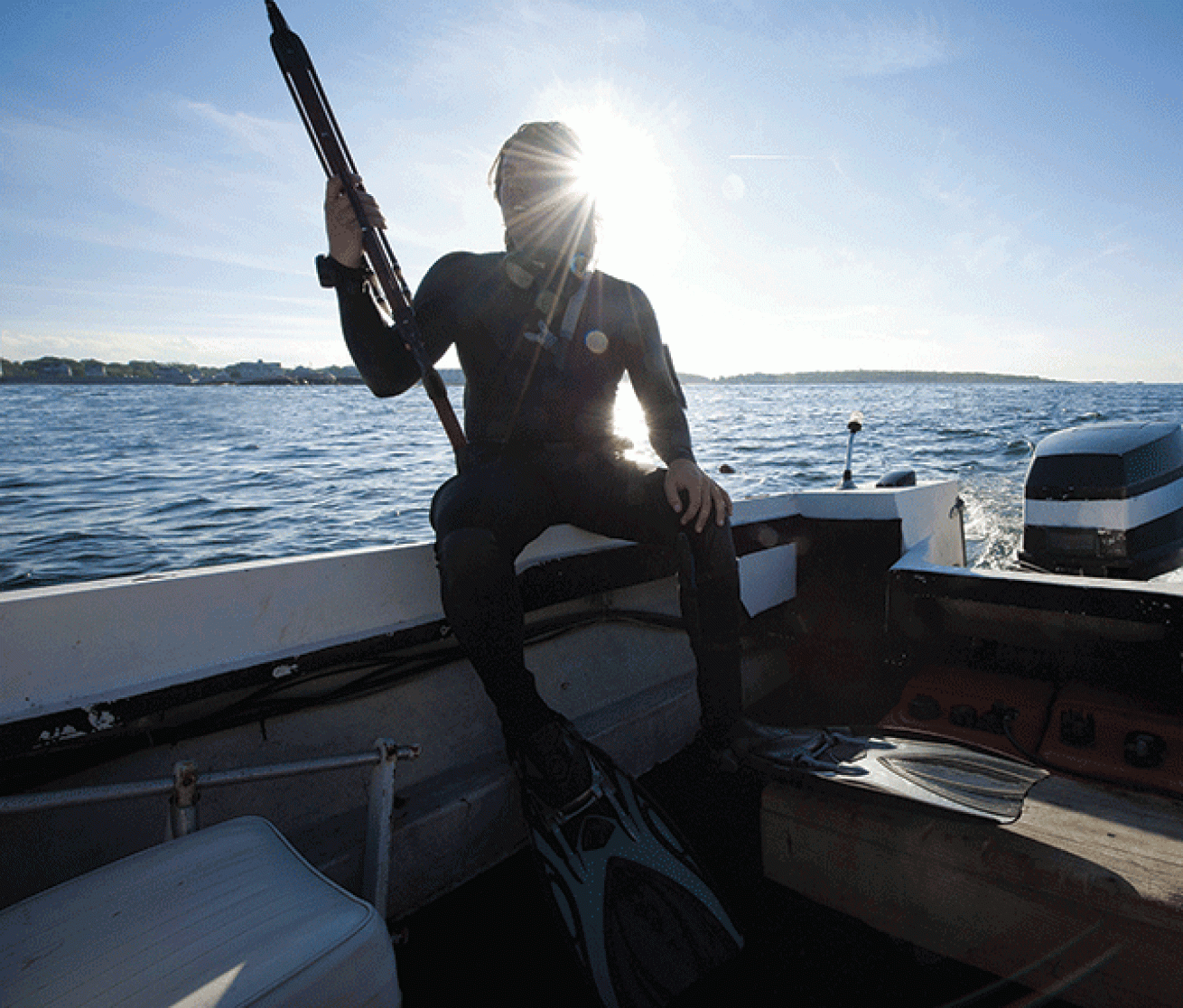
SPEARFISHING ON SCUBA IS DETRIMENTAL TO MARINE LIFE
Others argue that selectively killing the biggest fish when spearfishing on scuba is exactly the problem.
“The main indicator of ‘fitness’ in fish is size — it really matters. A 100-centimeter grouper produces about 15 times as many eggs as a 40-centimeter grouper does. Spearfishers target the last remaining large fish. This leaves the smaller fish to their less-vigorous reproduction and decreases the total reproductive output and, thus, the total fish in future populations,” according to Melanie McField, director of the Smithsonian Institution’s Healthy Reefs Initiative.
Some species of fish come to shallow water to lay their eggs, where the males are left to guard the nests. When the male guardian is killed, the eggs will also die.
Spearfishing on scuba also allows hunters to chase fish deeper, taking away the fish’s refuge. In the abstract of his study, “Depth Refuge and the Impacts of Scuba Spearfishing on Coral Reef Fisheries,” Steven J. Lindfield concluded: “Comparisons between Guam and the nearby Commonwealth of Northern Mariana Islands revealed differences in the assemblage of fished species and also greater size of scarines (parrotfish) and acanthurids (surgeonfish/unicornf ish) in deep water where scuba fishing is banned. These results suggest that scuba spearfishing impacts reef-fish populations and that the restriction of this fishing method will ensure refuge for fish populations in deeper waters. We recommend a ban on scuba spearfishing to preserve or aid the recovery of large, functionally important coral-reef species and to improve the sustainability of coral-reef fisheries.”
CONCLUSION
There is quite a lot of difference of opinion on this topic from scientists and divers, some of whom are also spearfishermen. Everyone seems to agree that spearfishing has less by-catch and waste than net or long-line fishing. And everyone agrees that it takes common sense, safe diving practices and experience to be a good spearfisher on scuba.
Kell Levendorf, director of training and community development at Divers Direct summed it up by saying, “I do not believe that recreational spearfishermen — even on scuba — pose a significant threat, provided they follow the laws and regulations and display common sense in environmental awareness. Then again, when I see pictures of Goliath Groupers with spears through their heads, I am reminded just how difficult a task that might be.”
Still, you only have to look through some of the early dive magazines from the 1950s and early 1960s when everyone in the water was spearfishing. The size of the fish they were photographed with is incredible, and there isn’t anything like that in the water today.
Want more expert opinions from Scuba Diving?
Are Oil Rigs Good or Bad? | Are Rebreathers Recreational? | Should I Wreck Dive without Training?


